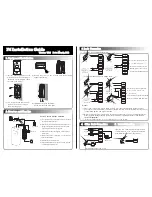
CHAPTER 6 DMA FUNCTIONS (DMA CONTROLLER)
117
User’s Manual U15195EJ5V0UD
6.3.8 DMA trigger factor registers 0 to 3 (DTFR0 to DTFR3)
These 8-bit registers are used to control the DMA transfer start trigger via interrupt requests from on-chip
peripheral I/O.
The interrupt requests set with these registers serve as DMA transfer start factors.
These registers can be read/written in 8-bit units. Only bit 7 (DFn) can be read/written in 1-bit units, and bits 5 to 0
(IFCn5 to IFCn0) can be read/written in 8-bit units. (n = 0 to 3).
Be sure to set bit 6 to 0. If it is set to 1, the operation is not guaranteed.
Cautions 1. Be sure to stop the DMA operation before making changes to DTFRn register settings.
2. Except INTP0 to INPT4 and INTP20 to INTP25 (when noise elimination by an analog filter is
selected), an interrupt request input in standby mode (IDLE or software STOP mode) does
not trigger DMA transfer.
3. INTCM004 and INTCM005 cannot be used as DMA trigger sources.
4. If the start factor for DMA transfer is changed using the IFCn5 to IFCn0 bits, be sure to clear
(0) the DFn bit with the instruction immediately after the change.
(1/3)
<7>
DTFR0
6
5
4
3
2
1
0
DF0
0
IFC05
IFC04
IFC03
IFC02
IFC01
IFC00
Address
FFFFF810H
After reset
00H
<7>
DTFR1
6
5
4
3
2
1
0
DF1
0
IFC15
IFC14
IFC13
IFC12
IFC11
IFC10
Address
FFFFF812H
After reset
00H
<7>
DTFR2
6
5
4
3
2
1
0
DF2
0
IFC25
IFC24
IFC23
IFC22
IFC21
IFC20
Address
FFFFF814H
After reset
00H
<7>
DTFR3
6
5
4
3
2
1
0
DF3
0
IFC35
IFC34
IFC33
IFC32
IFC31
IFC30
Address
FFFFF816H
After reset
00H
Bit position
Bit name
Function
7
DFn
This is a DMA transfer request flag.
Only 0 can be written to this bit.
0: No DMA transfer request
1: DMA transfer request
If the interrupt specified as the DMA transfer start factor occurs and it is necessary to clear
the DMA transfer request while DMA transfer is disabled (including when it is aborted by
NMI or forcibly stopped by software), stop the operation that has caused the interrupt (e.g.,
if serial reception is in progress, by disabling reception) and then clear the DFn bit.
If it is clearly known that the interrupt will not occur until the next DMA transfer is started, it
is not necessary to stop the operation that has caused the interrupt.
Remark
n = 0 to 3
















































